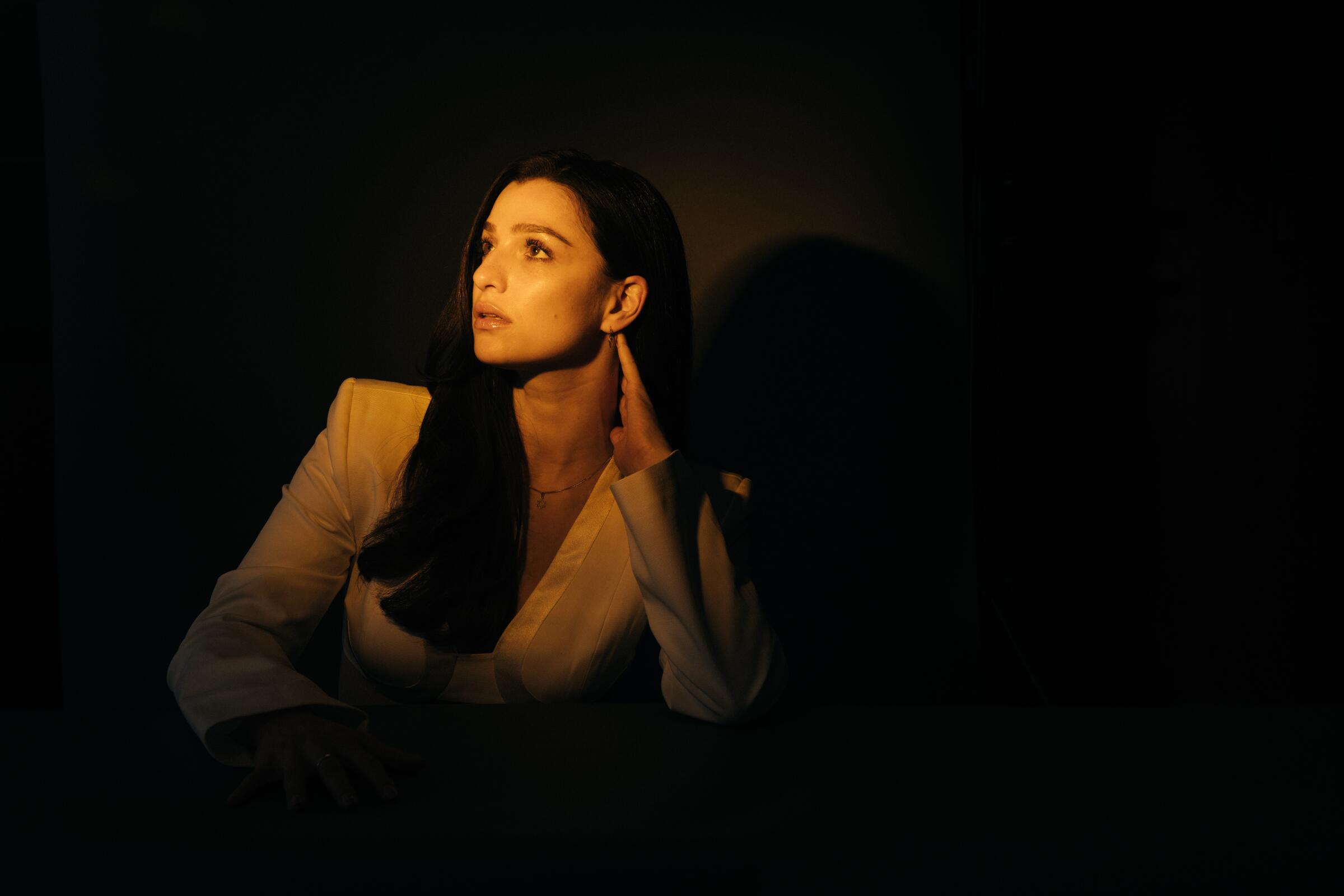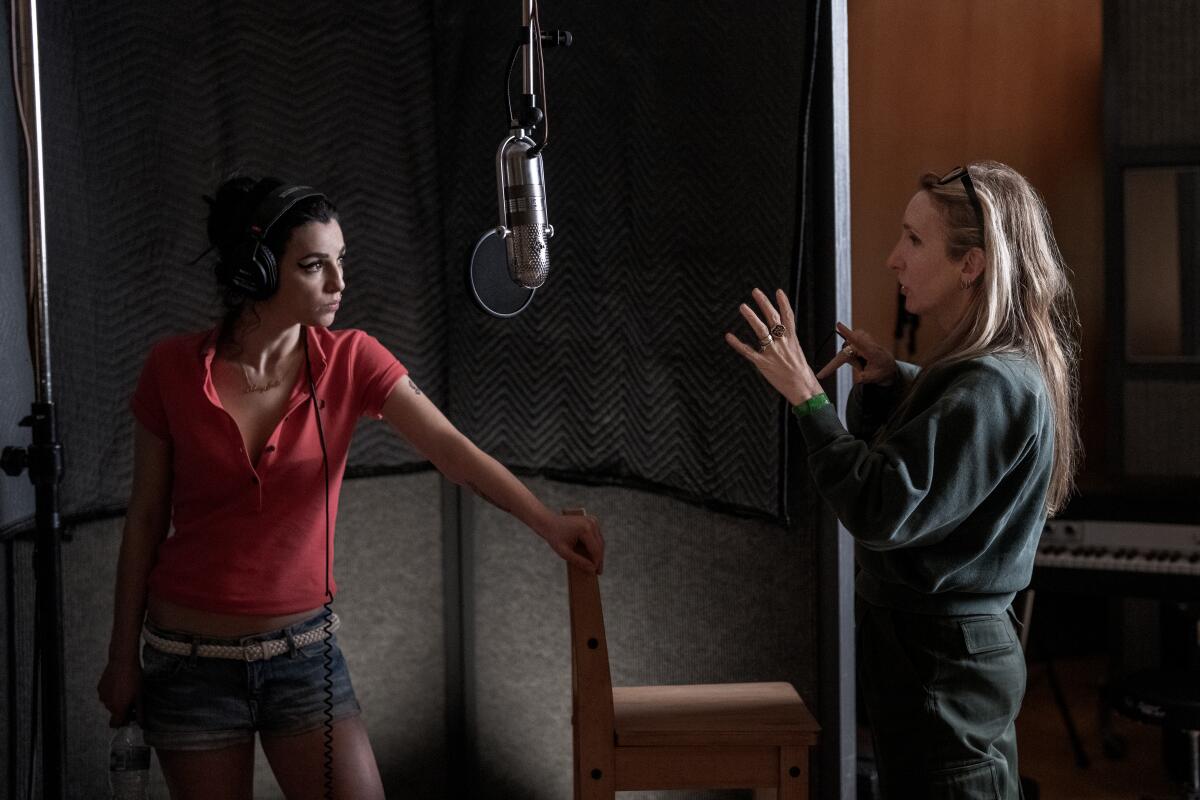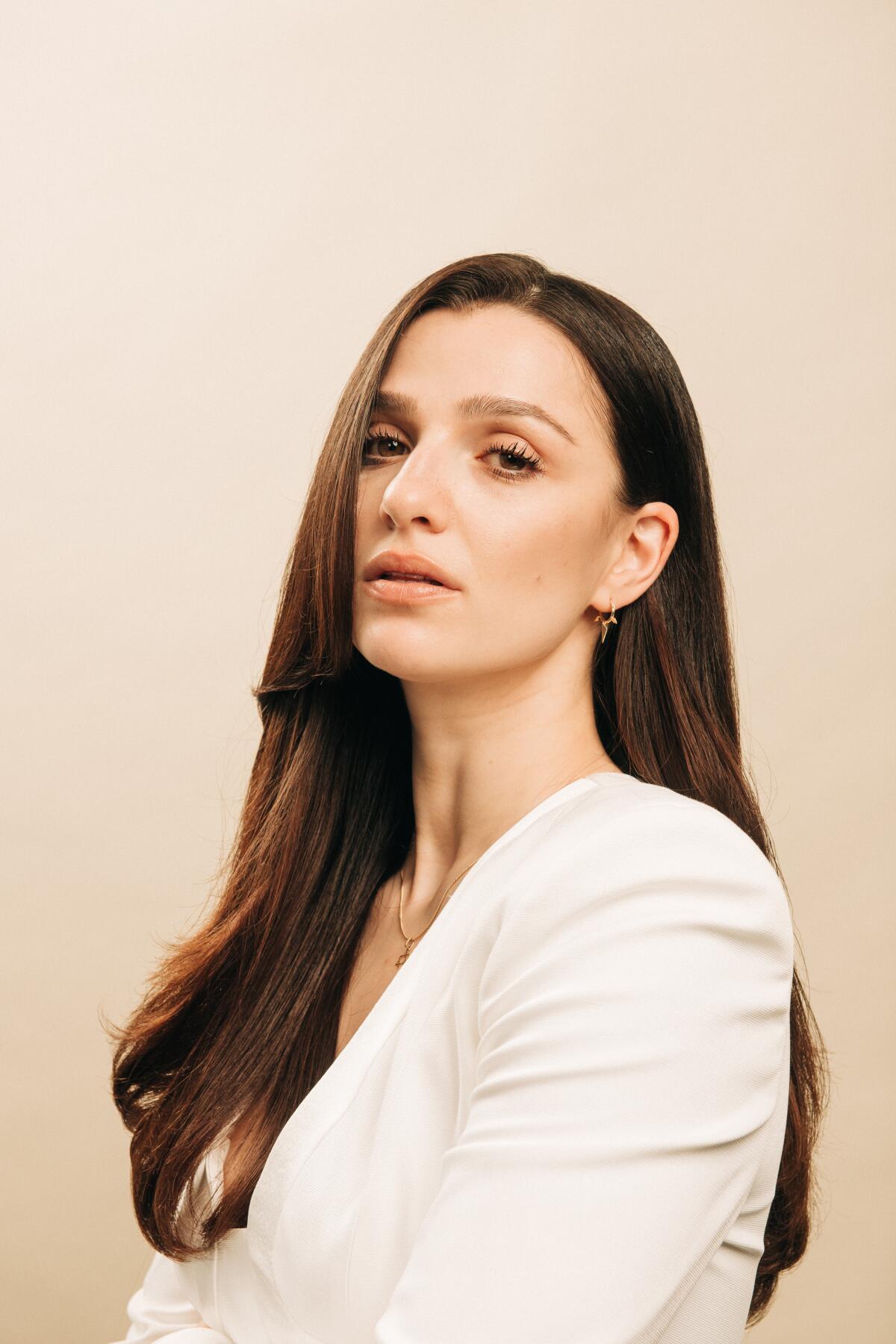Only good movies
Get the Indie Focus newsletter, Mark Olsen's weekly guide to the world of cinema.
You may occasionally receive promotional content from the Los Angeles Times.

For her first meeting about “Back to Black” in 2022, actor Marisa Abela made an instinctive decision to show up as herself, rather than dressed in a way that hinted at Amy Winehouse’s iconic look. She was the only one there not in some kind of costume.
“It would feel incredibly inauthentic for me to turn up at that meeting doing some kind of shtick, like if I was chewing gum or I stubbed my cigarette out before I walked in,” Abela, 27, says, speaking at London’s Ham Yard Hotel on a particularly rainy day in April.
She looks nothing like Winehouse. Her energy is quieter, her British accent more subtle. No one in the busy restaurant appears to notice her, despite her face currently being plastered on billboards and buses all over town.
“I didn’t want to do some kind of clichéd thing,” she adds. “So I just went in as me and spoke about how I was feeling about her.”
Initially, though, director Sam Taylor-Johnson wasn’t convinced. She’d asked casting director Nina Gold to compile a list of actors capable of, as she puts it, “a truly authentic performance,” with a preference for someone relatively unknown. Abela, best known for playing Yasmin on the HBO drama “滨苍诲耻蝉迟谤测,” struck the director as too sweet and shy. But as Taylor-Johnson put her eye to the camera, something shifted.
“She looked into the lens — straight through — and into my soul,” Taylor-Johnson, 57, says, speaking from her home in London over Zoom. “I grabbed Nina’s hand and squeezed it because I knew, in that moment, it was her. It wasn’t anything to do with how she spoke and read the lines. It was like a DNA shift.”
Taylor-Johnson wasn’t necessarily searching for a natural singer to play Winehouse, the acclaimed soul singer whose 2006 “Back to Black” album became an instant classic, but who died on the cusp of superstardom in 2011. The filmmaking team, including music producer Giles Martin and music supervisor Iain Cooke, had backup plans in place, including having the lead lip-sync with Winehouse’s actual vocals. Abela, who had no musical training, wasn’t even required to sing for her audition. But she unleashed an impromptu version of “Fly Me to the Moon” anyway.
“It wasn’t for me, at that stage, thinking I could sing like Amy,” Abela says, describing one of the film’s early scenes where Amy does a duet with her dad at a family party, a scene that was given to the actor for her audition. “Why would I leave that beautiful point of connectivity out of what I’m doing?”
Ahead of shooting, Abela spent four months working closely with vocal coach Anne-Marie Speed. At first, Taylor-Johnson simply wanted Abela to be able to lip-sync Winehouse’s songs with the correct facial movements. But as Martin was recording the instrumental tracks with Winehouse’s real-life band, known as the Amy Winehouse Band (who are played by younger actors in the film), at Abbey Road Studios, it became evident that the actor was a shockingly quick study.

“As we started to work with Marisa, someone who could supposedly not sing — or that’s what she said — she was phenomenal,” remembers Cooke. “She had great timing, great phrasing and great pitch, and she worked so hard. What she did is an extraordinary achievement.”
As Abela, who also learned guitar and worked with movement and dialect coaches, immersed herself more fully into the role, she understood there would be an “emotional disconnect,” she says, if she opted to lip-sync. She didn’t want to mimic Winehouse, but instead hoped to “get as close as possible to something that is recognizable as Amy’s sound.” Ultimately, what viewers hear in the film is 100% Abela.
“That way I could keep her emotional life alive through the songs,” Abela says. “It was really important to me to try. For me, these kinds of films aren’t about tricking an audience into thinking they’re watching the real person. If there are moments where you get completely lost in that person’s emotional truth and psychological life, then that is the point. The singing is just an extension of that.”
“Back to Black,” written by Matt Greenhalgh, centers on Winehouse’s life over the course of her two albums, 2003’s “Frank” and, three years later, “Back to Black.” Her tumultuous relationship with on-again-off-again boyfriend and husband Blake Fielder-Civil (Jack O’Connell) is at the core of the story, as are her connections to her grandmother Cynthia (Lesley Manville) and her father Mitch (Eddie Marsan). Taylor-Johnson shot the film in reverse chronological order to ensure that Abela could lose weight for later scenes, when she’s fragile and addicted to drugs and alcohol, in a healthy way under the supervision of a nutritionist and a trainer. Abela did extensive research on Winehouse, and spoke with members of her family and people who knew her.
“What’s difficult is deciding what the truth of the person that you’re going to play is,” Abela says. “If you asked my mom to describe me in three words, they will be three different words than what my boyfriend would use or what my best friend would use. So you have to take everything with a pinch of salt: That was how this person saw Amy.”
Production took place over 45 days in early 2023 at more than 50 locations around London, including Camden pubs the Good Mixer and Dublin Castle, where patrons shared stories about the real Winehouse performing there. Abela sang live on set, sometimes doing 30 or 40 takes of a particular song. It added a real electricity to the musical numbers, especially the re-creation of Winehouse’s famous concert at Glastonbury. The festival’s Pyramid Stage was rebuilt in a studio, emphasizing, Cooke says, how essential the decision for Abela to sing was to the scenes.
“A big part of it was embodying the spirit of Amy’s performance,” he says. “And that captures the spirit of a Glastonbury performance like you probably have never seen on camera before. A lot of that is because it is wild and chaotic and free.”
Shooting on location, particularly around Camden and Soho, was challenging because it meant that Abela was on display while filming the biggest role of her career to date. Paparazzi followed the “Back to Black” production, like they had Winehouse herself, and one even infiltrated the set by joining a group of extras dressed as photographers during a particular scene. For better or worse, it helped Abela understand the extent to which Winehouse was under a microscope.
“Once while we were filming, one came up to me and said, ‘You can’t get rid of me. I’m like a bad smell,’” she says. “It was definitely difficult to continue at some points during the work because it’s hard to pretend that they’re not there. But to think about what Amy must have gone through as a 22-year-old woman on her own is so grim.”

Abela previously had small roles in the films “Rogue Agent” and “She Is Love” (her cameo as Teen Talk Barbie was largely cut from “Barbie”), and studied at the Royal Academy of Dramatic Art. She acknowledges that she is not a Method actor. But for the six weeks shooting “Back to Black” she had “no sense of self.”
“It was a physically and emotionally draining period,” Abela says. “Amy is such an intense life force. There are different types of characters — some are solid and if you put them in a box there’s still a lot of space left, and some are like a liquid and they move around and you’re still in there too. But some are like gas and fill whatever space they’re in. That’s what playing Amy was like.”
Even before being cast, Abela inherently understood something about Winehouse. She was a teenager when the singer died from alcohol poisoning at age 27, but even as a kid, Winehouse’s songs and image had captivated her along with fans around the world. Abela grew up near Brighton in a Jewish family in an analogous situation to Winehouse. Her dad moved out when she was in grade school, under similar circumstances to Mitch Winehouse, so she understood the compulsion of a young woman to stand in the spotlight trying to be special.
“For Amy, that was singing and being a musician,” Abela says. “And for me it’s this. But it’s not about being fawned over in any way. It’s more about doing something and doing it well. I saw that in her in the footage of her at a young age and I recognized it so much. I do think that there’s this striving for perfection that can lead things into the unhealthy that I share with her. When I first started reading and rediscovering all the information that’s out there about Amy and watching the videos and footage of her life, I felt this immediate connection with her.”
This article was originally on a blog post platform and may be missing photos, graphics or links.
Abela only had a week off before she went from the set of “Back to Black” to shoot the third season of “滨苍诲耻蝉迟谤测,” which premieres on HBO this summer. It didn’t feel difficult because she says creators Mickey Down and Konrad Kay offer a sense of freedom and playfulness to the cast. It’s less pressure, too, because the series, set in the world of London finance, has cultivated a more niche audience.
“It’s like a club of people who love the show, and it’s a fun club to be a part of,” she says. “I think it would feel different if it felt like another project that was explosive and huge.”
Next, Abela is shooting thriller “Black Bag” with Steven Soderbergh in London, an opportunity she’s glad to take on because it meant creating a new character from scratch. And although her IMDb page isn’t extensive, she’s already revealed an ability to shapeshift from role to role.
“She’s one of those actors where they present as one thing and then literally can transform in such a way that you’ve forgotten who the original person was,” Taylor-Johnson says. “It’s really rare. She absolutely grabbed onto every opportunity she could and went wholeheartedly into it.”
Looking back, Abela says becoming Winehouse for “Back to Black” felt weirdly spiritual. She worked hard, sure, but without gripping the end result too tightly.
“It came from a place of real honesty and rawness that I was sensing from what I could see of Amy, rather than like trying to be her,” she says. “I was aware that I put everything I could have into it. And I think her fearlessness became mine in those moments. It was so freeing to be that brazen and to be living your own life in that way.”
It’s a feeling she hopes to hold on to even after she leaves Winehouse behind.
Only good movies
Get the Indie Focus newsletter, Mark Olsen's weekly guide to the world of cinema.
You may occasionally receive promotional content from the Los Angeles Times.